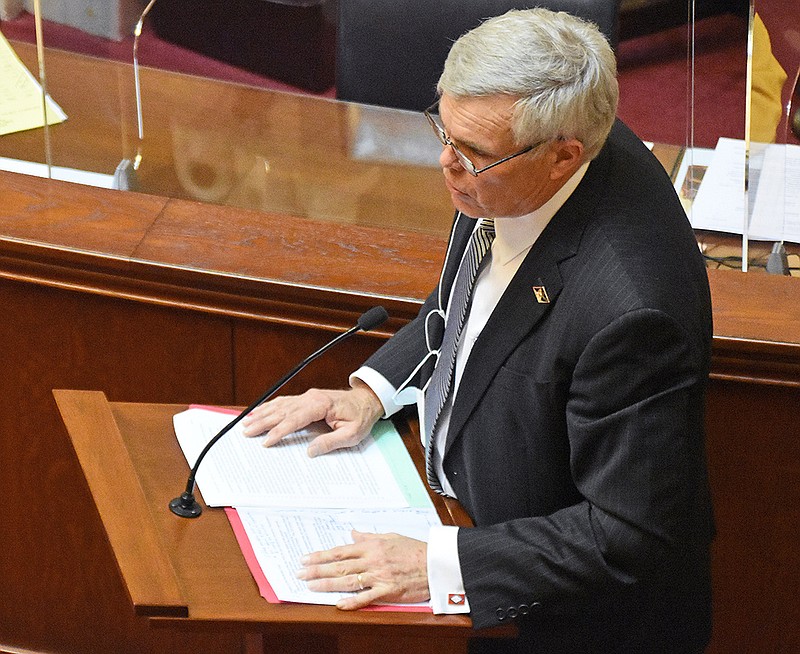The Arkansas Senate on Thursday approved a bill that would require the state Alcoholic Beverage Control Division and the Department of Health to return fines that were paid by businesses sanctioned during the public-health emergency between March 11 and Sunday.
The measure also would require these agencies to return fines to businesses that were sanctioned during any subsequent extensions of the emergency. The fines were for failing to comply with a rule, order or directive to mitigate or prevent the spread of the coronavirus.
The Senate voted 19-14 to send Senate Bill 301 by Sen. Dan Sullivan, R-Jonesboro, to the House for further consideration.
The bill would require the Alcoholic Beverage Control Division and Health Department to return the fines by June 30 this year if they were collected during the period from March 11 through Sunday. For any extensions of the emergency, the state would be required to return the fine within 60 days of the fine's collection.
[CORONAVIRUS: Click here for our complete coverage » arkansasonline.com/coronavirus]
SB301 wouldn't require a state agency to return fines for compliance failures at long-term care facilities, including nursing homes; residential care facilities; assisted-living facilities; hospitals; hospice facilities; human development centers; or any other residential entity that houses 25 or more people. The requirement also wouldn't apply to any other fines collected that are not directly related to a rule, order or directive to mitigate or prevent the spread of the virus.
The Alcoholic Beverage Control Division received $37,950 in fines between July 1 and Feb. 2. The division receives fines weekly, so that amount has increased since Feb. 2, the state Department of Finance and Administration said in its legislative impact statement on the bill. An estimate of the total fines paid by businesses to the Health Department was not available through a spokesman for the department on Thursday.
"This bill is only about the separation of powers," Sullivan told senators. "It is about making a statement to those who we represent that we have their backs."
Sullivan said the bill isn't about disrespecting Gov. Asa Hutchinson, who issued the executive orders, or the executive branch.
"It is about respecting the legislative branch," he said. "If there is another emergency at some point 30, 60, 90, 120 or 300 days, this bill just makes a statement that we want to be included in those decisions."
Sen. Stephanie Flowers, D-Pine Bluff, asked Sullivan: "Do you think it sets a bad precedent?"
Sullivan said he believes these state fines of businesses were arbitrary.
Afterward, Hutchinson said in a written statement, "I oppose this legislation because it undermines fairness, compliance and public health."
Doralee Chandler, Alcoholic Beverage Control director, asked the Senate Public Health, Welfare and Labor Committee to consider not requiring the refunding of the fines "because of the message that is being sent" and "refunding [the fines] rewards the noncompliance behavior."
Laura Shue, general legal counsel for the Health Department, told the Senate committee, "This bill, if enacted, subjects the state to future litigation in the Claims Commission and federal court for various entities for enforcement of legitimate health directives. More importantly, it diminishes the ability to use established procedures to protect others in a public health emergency."
